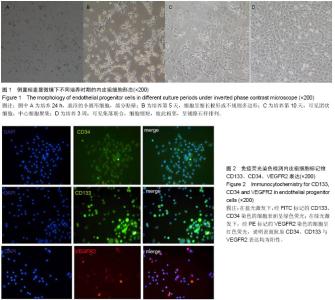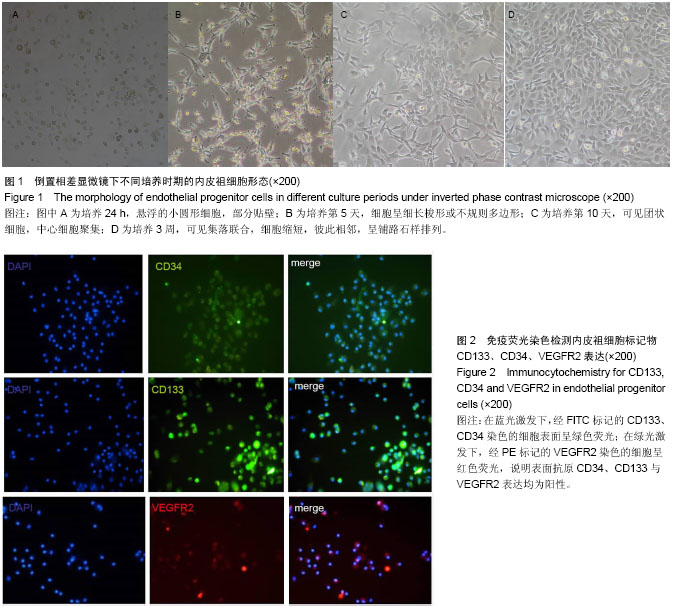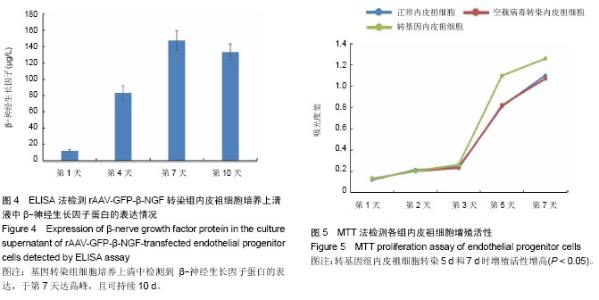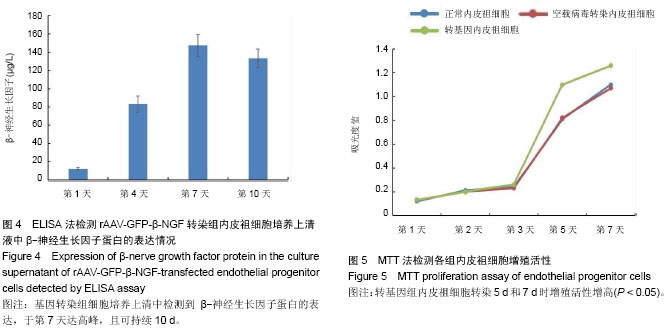Chinese Journal of Tissue Engineering Research ›› 2015, Vol. 19 ›› Issue (36): 5853-5858.doi: 10.3969/j.issn.2095-4344.2015.36.021
Previous Articles Next Articles
Transfection of adeno-associated virus encoding beta-nerve growth factor into endothelial progenitor cells
Yang Zhong-yan, Gao Chun-zheng, Wu Dong-jin, Peng Chang-liang
- Second Hospital of Shandong University, Jinan 250033, Shandong Province, China
-
Online:2015-09-03Published:2015-09-03 -
Contact:Gao Chun-zheng, M.D., Chief physician, Master’s supervisor, Second Hospital of Shandong University, Jinan 250033, Shandong Province, China -
About author:Yang Zhong-yan, Master, Second Hospital of Shandong University, Jinan 250033, Shandong Province, China
CLC Number:
Cite this article
Yang Zhong-yan, Gao Chun-zheng, Wu Dong-jin, Peng Chang-liang. Transfection of adeno-associated virus encoding beta-nerve growth factor into endothelial progenitor cells [J]. Chinese Journal of Tissue Engineering Research, 2015, 19(36): 5853-5858.
share this article
| [1] Ahoniemi E, Pohjolainen T, Kautiainen H. Survival after spinal cord injury in Finland. J Rehabil Med. 2011;43(6):481-485. [2] 孙天胜,王献章,胥少汀.脊髓损伤修复的现状与展望[J].国外医学:骨科学分册, 2003, 24(2): 67-71. [3] Koda M, Hashimoto M, Murakami M, et al. Adenovirus vector-mediated in vivo gene transfer of brain-derived neurotrophic factor (BDNF) promotes rubrospinal axonal regeneration and functional recovery after complete transection of the adult rat spinal cord. J Neurotrauma. 2004;21(3):329-337. [4] Tuszynski MH, Grill R, Jones LL, et al. NT-3 gene delivery elicits growth of chronically injured corticospinal axons and modestly improves functional deficits after chronic scar resection. Exp Neurol. 2003;181(1):47-56. [5] Cao L, Liu L, Chen ZY, et al. Olfactory ensheathing cells genetically modified to secrete GDNF to promote spinal cord repair. Brain. 2004;127(Pt 3):535-549. [6] Aloe L,Bianchi P,Bellis AD, et al.Intranasal nerve growth factor bypasses the blood-brain barrier and affects spinal cord neurons in spinal cord injury. Neural Regen Res. 2014;9 (10): 1025-1030. [7] Asahara T, Murohara T, Sullivan A, et al. Isolation of putative progenitor endothelial cells for angiogenesis. Science. 1997; 275(5302):964-967. [8] Fadini GP, Agostini C, Avogaro A. Endothelial progenitor cells in cerebrovascular disease. Stroke. 2005;36(6):1112-1113 [9] Wrathall JR, Lytle JM. Stem cells in spinal cord injury. Dis Markers. 2008;24(4-5):239-250. [10] Okano H, Sakaguchi M, Ohki K, et al. Regeneration of the central nervous system using endogenous repair mechanisms. J Neurochem. 2007;102(5):1459-1465. [11] Michael GJ, Kaya E, Averill S, et al. TrkA immunoreactive neurones in the rat spinal cord. J Comp Neurol. 1997;385(3): 441-455. [12] Josephson A, Widenfalk J, Trifunovski A, et al. GDNF and NGF family members and receptors in human fetal and adult spinal cord and dorsal root ganglia.J Comp Neurol. 2001; 440(2): 204-217. [13] Oderfeld-Nowak B, Zaremba M, Lipkowski AW, et al. High-affinity NGF receptor in the rat spinal cord during acute and chronic phases of experimental autoimmune encephalomyelitis: a possible functional significance. Arch Ital Biol. 2003;141(2-3):103-116. [14] 臧大维,刘娟,Surindar Cheema,等.脊髓损伤后神经营养因子及干细胞治疗对轴突再生的影响:国外基础和临床研究新进展[J].中国组织工程研究与临床康复,2007,11(14):2787-2791,2796. [15] Chiaretti A, Genovese O, Riccardi R, et al. Intraventricular nerve growth factor infusion: a possible treatment for neurological deficits following hypoxic-ischemic brain injury in infants. Neurol Res. 2005;27(7):741-746. [16] Williams BJ, Eriksdotter-Jonhagen M, Granholm AC. Nerve growth factor in treatment and pathogenesis of Alzheimer's disease. Prog Neurobiol. 2006;80(3):114-128. [17] Diensthuber M, Lenarz T, Stöver T. Neurotrophic factor expression in vestibular schwannoma. An overview. Laryngorhinootologie. 2006;85(10):731-737. [18] Boyer M, Townsend LE, Vogel LM, et al. Isolation of endothelial cells and their progenitor cells from human peripheral blood. J Vasc Surg. 2000;31(1 Pt 1):181-189. [19] Timmermans F, Plum J, Yöder MC, et al. Endothelial progenitor cells: identity defined. J Cell Mol Med. 2009; 13(1):87-102. [20] Eggermann J, Kliche S, Jarmy G, et al. Endothelial progenitor cell culture and differentiation in vitro: a methodological comparison using human umbilical cord blood. Cardiovasc Res. 2003;58(2):478-486. [21] Taguchi A, Soma T, Tanaka H, et al. Administration of CD34+ cells after stroke enhances neurogenesis via angiogenesis in a mouse model. J Clin Invest. 2004;114(3):330-338. [22] Zhao ZM, Li HJ, Liu HY, et al. Intraspinal transplantation of CD34+ human umbilical cord blood cells after spinal cord hemisection injury improves functional recovery in adult rats. Cell Transplant. 2004;13(2):113-122. [23] Chen J, Sanberg PR, Li Y, et al. Intravenous administration of human umbilical cord blood reduces behavioral deficits after stroke in rats. Stroke. 2001;32(11):2682-2688. [24] Chen CT, Foo NH, Liu WS, et al. Infusion of human umbilical cord blood cells ameliorates hind limb dysfunction in experimental spinal cord injury through anti-inflammatory, vasculogenic and neurotrophic mechanisms. Pediatr Neonatol. 2008;49(3):77-83. [25] He T, Peterson TE, Holmuhamedov EL, et al. Human endothelial progenitor cells tolerate oxidative stress due to intrinsically high expression of manganese superoxide dismutase. Arterioscler Thromb Vasc Biol. 2004;24(11): 2021-2027. [26] Xue S, Zhang HT, Zhang P, et al. Functional endothelial progenitor cells derived from adipose tissue show beneficial effect on cell therapy of traumatic brain injury. Neurosci Lett. 2010;473(3):186-191. [27] Di Stefano R, Barsotti MC, Armani C, et al. Human peripheral blood endothelial progenitor cells synthesize and express functionally active tissue factor. Thromb Res. 2009;123(6): 925-930. [28] Horne MK, Nisbet DR, Forsythe JS, et al. Three-dimensional nanofibrous scaffolds incorporating immobilized BDNF promote proliferation and differentiation of cortical neural stem cells. Stem Cells Dev. 2010;19(6):843-852. [29] Sun Y, Jin K, Childs JT, et al. Vascular endothelial growth factor-B (VEGFB) stimulates neurogenesis: evidence from knockout mice and growth factor administration. Dev Biol. 2006;289(2):329-335. [30] Lunn JS, Pacut C, Backus C, et al. The pleotrophic effects of insulin-like growth factor-I on human spinal cord neural progenitor cells. Stem Cells Dev. 2010;19(12):1983-1993. [31] Ali SA, Pappas IS, Parnavelas JG. Collagen type IV promotes the differentiation of neuronal progenitors and inhibits astroglial differentiation in cortical cell cultures. Brain Res Dev Brain Res. 1998;110(1):31-38. [32] Yang XT, Bi YY, Feng DF. From the vascular microenvironment to neurogenesis. Brain Res Bull. 2011; 84(1): 1-7. [33] Xiong Y, Mahmood A, Chopp M. Neurorestorative treatments for traumatic brain injury. Discov Med. 2010;10(54):434-442. [34] Pluchino S, Cusimano M, Bacigaluppi M, et al. Remodelling the injured CNS through the establishment of atypical ectopic perivascular neural stem cell niches. Arch Ital Biol. 2010; 148(2):173-183. [35] Jin K, Xie L, Mao X, Greenberg MB, et al. Effect of human neural precursor cell transplantation on endogenous neurogenesis after focal cerebral ischemia in the rat. Brain Res. 2011;1374:56-62. [36] Madhavan L, Collier TJ. A synergistic approach for neural repair: cell transplantation and induction of endogenous precursor cell activity. Neuropharmacology. 2010;58(6): 835-844. [37] 杜公文,杜怡斌,张辉,等.血管内皮祖细胞在脊髓损伤修复中的研究进展[J].中国矫形外科杂志, 2013, 21(14): 1423-1426. [38] Büning H, Nicklin SA, Perabo L, et al. AAV-based gene transfer. Curr Opin Mol Ther. 2003;5(4):367-375. |
| [1] | Liu Cong, Liu Su. Molecular mechanism of miR-17-5p regulation of hypoxia inducible factor-1α mediated adipocyte differentiation and angiogenesis [J]. Chinese Journal of Tissue Engineering Research, 2021, 25(7): 1069-1074. |
| [2] | Luo Xuanxiang, Jing Li, Pan Bin, Feng Hu. Effect of mecobalamine combined with mouse nerve growth factor on nerve function recovery after cervical spondylotic myelopathy surgery [J]. Chinese Journal of Tissue Engineering Research, 2021, 25(5): 719-722. |
| [3] | Zhao Xiang, Wei Cuilan, Zhang Yeting. Neurogenesis and neuroinflammation under exercise: alteration and regulation [J]. Chinese Journal of Tissue Engineering Research, 2021, 25(5): 813-820. |
| [4] | Chen Junyi, Wang Ning, Peng Chengfei, Zhu Lunjing, Duan Jiangtao, Wang Ye, Bei Chaoyong. Decalcified bone matrix and lentivirus-mediated silencing of P75 neurotrophin receptor transfected bone marrow mesenchymal stem cells to construct tissue-engineered bone [J]. Chinese Journal of Tissue Engineering Research, 2021, 25(4): 510-515. |
| [5] | Ma Zhijie, Li Jingyu, Cao Fang, Liu Rong, Zhao Dewei. Influencing factors and biological property of novel biomedical materials: porous silicon carbide coated with bioactive tantalum [J]. Chinese Journal of Tissue Engineering Research, 2021, 25(4): 558-563. |
| [6] | Shi Xiaoxiu, Mao Shilong, Liu Yang, Ma Xingshuang, Luo Yanfeng. Comparison of tantalum and titanium (alloy) as orthopedic materials: physical and chemical indexes, antibacterial and osteogenic ability [J]. Chinese Journal of Tissue Engineering Research, 2021, 25(4): 593-599. |
| [7] | Yang Junhui, Luo Jinli, Yuan Xiaoping. Effects of human growth hormone on proliferation and osteogenic differentiation of human periodontal ligament stem cells [J]. Chinese Journal of Tissue Engineering Research, 2021, 25(25): 3956-3961. |
| [8] | Xie Yang, Lü Zhiyu, Zhang Shujiang, Long Ting, Li Zuoxiao. Effects of recombinant adeno-associated virus mediated nerve growth factor gene transfection on oligodendrocyte apoptosis and myelination in experimental autoimmune encephalomyelitis mice [J]. Chinese Journal of Tissue Engineering Research, 2021, 25(23): 3678-3683. |
| [9] | Chen Siqi, Xian Debin, Xu Rongsheng, Qin Zhongjie, Zhang Lei, Xia Delin. Effects of bone marrow mesenchymal stem cells and human umbilical vein endothelial cells combined with hydroxyapatite-tricalcium phosphate scaffolds on early angiogenesis in skull defect repair in rats [J]. Chinese Journal of Tissue Engineering Research, 2021, 25(22): 3458-3465. |
| [10] | Mo Jianling, He Shaoru, Feng Bowen, Jian Minqiao, Zhang Xiaohui, Liu Caisheng, Liang Yijing, Liu Yumei, Chen Liang, Zhou Haiyu, Liu Yanhui. Forming prevascularized cell sheets and the expression of angiogenesis-related factors [J]. Chinese Journal of Tissue Engineering Research, 2021, 25(22): 3479-3486. |
| [11] | Li Xinping, Cui Qiuju, Zeng Shuguang, Ran Gaoying, Zhang Zhaoqiang, Liu Xianwen, Fang Wei, Xu Shuaimei. Effect of modification of β-tricalcium phosphate/chitosan hydrogel on growth and mineralization of dental pulp stem cells [J]. Chinese Journal of Tissue Engineering Research, 2021, 25(22): 3493-3499. |
| [12] | Zhou Anqi, Tang Yufei, Wu Bingfeng, Xiang Lin. Designing of periosteum tissue engineering: combination of generality and individuality [J]. Chinese Journal of Tissue Engineering Research, 2021, 25(22): 3551-3557. |
| [13] | Chen Song, He Yuanli, Xie Wenjia, Zhong Linna, Wang Jian. Advantages of calcium phosphate nanoparticles for drug delivery in bone tissue engineering research and application [J]. Chinese Journal of Tissue Engineering Research, 2021, 25(22): 3565-3570. |
| [14] | Dai Min, Wang Shuai, Zhang Nini, Huang Guilin, Yu Limei, Hu Xiaohua, Yi Jie, Yao Li, Zhang Ligang. Biological characteristics of hypoxic preconditioned human amniotic mesenchymal stem cells [J]. Chinese Journal of Tissue Engineering Research, 2021, 25(19): 3004-3008. |
| [15] | Dai Yaling, Chen Lewen, He Xiaojun, Lin Huawei, Jia Weiwei, Chen Lidian, Tao Jing, Liu Weilin. Construction of miR-146b overexpression lentiviral vector and the effect on the proliferation of hippocampal neural stem cells [J]. Chinese Journal of Tissue Engineering Research, 2021, 25(19): 3024-3030. |
| Viewed | ||||||
|
Full text |
|
|||||
|
Abstract |
|
|||||





